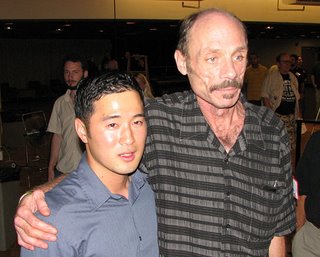Army outlines case against Fort Lewis soldier refusing Iraq duty

http://democratherald.com/articles/2006/08/19/news/oregon/friwest08.txt
Army outlines case against Fort Lewis soldier refusing Iraq duty
FORT LEWIS, Wash. (AP) — The Army has laid out its case against a lieutenant facing possible court-martial for refusing to go to Iraq, showing video footage of the officer calling the war illegal.The investigating officer who listened to the evidence Thursday will recommend whether 1st Lt. Ehren Watada should stand trial on charges of missing troop movement, conduct unbecoming an officer and contempt toward officials.
Lt. Col. Mark Keith could recommend anything from dismissal of the charges to a general court-martial. Keith, who has unlimited time to consider the evidence, will make his recommendation to Lt. Gen. James Dubik, commander of this base south of Seattle, who has final say on whether Watada should stand trial.
If convicted, Watada could face seven years in prison and dishonorable discharge.Army prosecutor Capt. Dan Kuecker played three video clips of comments Watada made last weekend, as well as on June 7, when he publicly announced his decision to refuse deployment.Kuecker also presented the hearing with Watada’s statements to reporters, in which he said he felt the Bush administration deceived Americans in order to initiate the war.In the final video, taken at the Veterans for Peace convention last weekend in Seattle, Watada said it is up to military personnel to stop the war.“It is time for change, and change starts with all of us,’’ he said. He went on to offer the veterans a “radical idea.’’“To stop an illegal and unjust war, soldiers and service members can choose to stop fighting it,’’ he said.Kuecker contended that Watada’s statements against the war, as well as his refusal to go to Iraq, could adversely affect the morale of his fellow soldiers now serving in the Middle East.Watada, 28, of Honolulu, was charged last month after he refused to deploy to Iraq on June 22 with his Fort Lewis Stryker unit, the 3rd Brigade, 2nd Infantry Division.He sat quietly during the hearing, flanked by his lawyers, Eric Seitz of Honolulu and Army Capt. Mark Kim. His father and stepmother sat in the back of the hearing room.Kuecker called on Capt. J.C. Kaplan, also with the 3rd Brigade, who said he oversaw administrative and logistical operations as members of the brigade prepared for deployment and witnessed Watada’s failure to show up.Seitz said he is not denying that Watada missed troop movement, but also noted that Watada asked to be sent to Afghanistan instead of Iraq, and on two occasions asked to be allowed to resign. All requests were denied.Seitz called three witnesses to support Watada’s contention that the Iraq invasion violated domestic and international law.University of Illinois Professor Francis Boyle, an international law expert, said the Iraq war was not authorized by the United Nations Security Council and was approved by Congress under false pretenses.He said Congress approved going to war only after being lied to by the Bush administration about Iraq having weapons of mass destruction and Saddam Hussein’s alleged ties to the Sept. 11, 2001, attacks.“This constitutes ... a conspiracy to defraud the United States government,’’ Boyle said.After researching the U.S. invasion of Iraq, Watada has said he decided it was an illegal and unjust war.Watada made a very extensive study of the facts, Boyle said.“The more you know, the higher your rank, the more your responsibility,’’ he said, adding that if Watada had deployed he would have been facilitating a crime against peace.Kuecker objected to the relevance of Boyle’s testimony, saying the legality of the war is not to be decided by a military court.Responding to a question from Keith, Boyle acknowledged that either a U.S. federal court or the U.S. Supreme Court could declare the war to be illegal.Further testimony on international law came from defense witnesses Denis Halliday, a former United Nations assistant secretary general, and retired Army Col. Ann Wright.During Wright’s testimony, she also noted that it is part of general Army training that military personnel are told they do not have to follow an unlawful or illegal order.“It’s in the spirit and ethos of the military that you have to distinguish between lawful and unlawful orders,’’ said Wright, who served 29 years on active duty and in the reserves and is a former U.S. diplomat. “We want military personnel to think about what they’re doing.’’But Kuecker called Watada’s behavior “dangerous’’ and said it was not the lieutenant’s job to decide whether the war is lawful.“He betrayed his fellow soldiers who are now serving in Iraq,’’ Kuecker said.Seitz said Watada wasn’t trying to vilify President Bush, but simply to express his opinion about a war he feels is illegal.Watada’s comments are protected by the Constitution, Seitz said, adding his client is entitled to refuse to participate in what he considers to be a war of aggression.
Subscribe now

0 Comments:
Post a Comment
<< Home